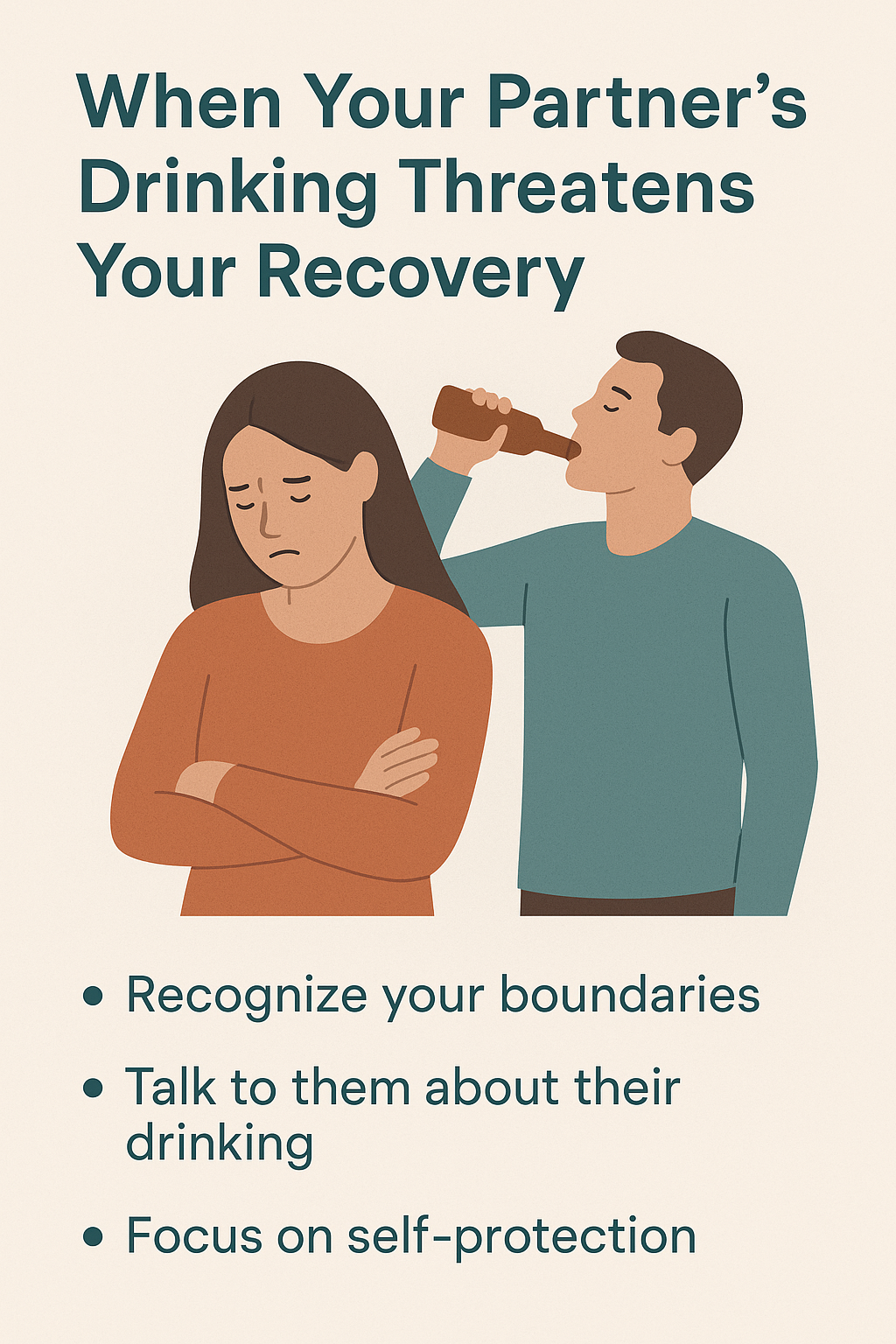Abstaining from alcohol or drug use, a supportive home environment can make all the difference. But when your partner still drinks or uses, things get complicated fast. Every day triggers, such as seeing a drink, smelling alcohol, or watching them use, can stir up cravings and stress. You may wonder if their habits are holding you back or if recovery can truly thrive in that setting. It’s a tough space where love and healing often collide. Understanding their impact, setting boundaries, and finding outside support are key. This isn’t about blame—it’s about protecting your progress and keeping your recovery first.
How a Partner’s Drinking Influences Recovery
Early recovery is already a rollercoaster at times, and it only gets bumpier when alcohol is still in the picture at home. Even if your partner isn’t drinking to excess, having alcohol around or seeing them drink can trigger cravings and make it tougher to stay focused on your goals. I hear from people all the time who feel torn; they want a healthy relationship but also need to prioritize recovery.
Most experts in addiction and mental health agree that the environment plays a significant role in shaping habits. One study found that living with a partner who drinks heavily increases the risk of relapse for those in alcohol recovery, especially in the first two years.
There are a few ways your partner’s drinking can show up as a challenge:
- Easy access: Alcohol or drugs are around, so it’s easy to get tempted.
- Triggers: Seeing alcohol, smelling it, or even watching your partner pour a drink can make cravings spike.
- Mixed Messages: You might feel like your recovery plans aren’t being taken seriously.
- Social Pressure: Partners might encourage drinking at events or downplay your choice to abstain.
Over time, these pressures can accumulate significantly. Recovery means building a whole new way of living, and constant reminders of old habits don’t make that easier.
Recognizing Warning Signs: Is Your Partner’s Drinking Causing You Harm?
It’s not always obvious when someone else’s behaviors are throwing off your recovery. Sometimes, things feel off, but you’re not sure why. Here’s what to watch for if your partner’s drinking might be hurting your progress:
- You regularly feel anxious or irritated after they drink.
- Cravings seem worse when there is alcohol around.
- You find yourself hiding your recovery goals or feeling embarrassed about them.
- You skip meetings, workouts, or healthy routines when you’ve been drinking.
- Arguments or tension flare up more after they’ve had a few drinks.
If these signs ring true, it may be time to take a hard look at how your partner’s drinking is affecting your recovery.
Tips for Staying on Track When Your Partner Still Drinks
Living with someone who still uses alcohol doesn’t make recovery impossible, but it does take some extra planning and support. Here’s what’s helped me and others I know in similar situations:
- Communicate Boundaries: Talking openly about your recovery goals and how you’d like alcohol to be handled at home can make a big difference. Some people ask for no drinking in the house, while others establish rules prohibiting alcohol in shared spaces. You get to decide what works for you and what feels uncomfortable.
- Create a Support Plan: This can mean having a sponsor, counselor, or trusted friend you reach out to when things get rough. Sometimes, just texting someone that your partner is drinking can help get those cravings out in the open.
- Build a Safe Zone: Create a designated area in your home where you can relax and recharge, away from the daily hustle and bustle. Set up the space with things you enjoy, such as music, books, exercise equipment, recovery materials, or anything else that helps you feel grounded.
- Stay Busy with Healthy Habits: The more you fill your days with positive habits, the less room there is for cravings or resentment. This can be as simple as taking a walk every evening or tuning in to a favorite show before bed.
- Make a Plan for Social Events: If you and your partner go out together, know ahead of time whether you’re comfortable being around alcohol and what your plan is if things get tough. Sometimes, bringing your own nonalcoholic drinks or having a code word for when you’re ready to leave is pretty handy.
Common Challenges and How to Find Your Way Through Them
Living with someone who still drinks can lead to awkward or challenging moments. Here’s how I’ve seen people get through some of the most typical roadblocks:
- Feeling Alone or Unsupported: You might feel like your partner doesn’t “get” what you’re going through. Ask if they’ll join you for a recovery meeting or read a recovery book together. If they aren’t willing, remember you’re not alone; there are online support groups just for people whose loved ones still drink.
- Dealing with Arguments: Fights are more likely when someone’s been drinking. Try saving essential conversations for sober times. It’s okay to say you’ll only talk about serious topics when both people are sober.
- Second-Guessing Your Own Progress: Setbacks happen, but your recovery is your own adventure. Even when your partner doesn’t change, your efforts still count.
- Mixed Emotions About Change: Some worry that if their partner stops drinking or drinks less, it’ll mix up the relationship in ways they aren’t sure about. Therapy or counseling, whether solo or as a couple, can help you sort out your feelings.
Ways to Strengthen Recovery When Living with a Partner Who Drinks
Keeping your recovery a priority doesn’t always mean things are tense at home. A few strategies can help you stay focused and feel stronger, even if your partner isn’t in the same place:
- Connect with Others: Whether it’s recovery meetings, message boards, or group chats, having a community makes things less isolating. These groups can boost your confidence and offer advice from people who have been in a similar situation.
- Educate Yourself: Resources like Al-Anon or SMART Recovery Family & Friends are designed for people in your shoes, offering practical, real-life tips and plenty of encouragement.
- Focus on Your Wins: Celebrate your milestones, no matter how tiny. Consider marking your progress on a calendar or treating yourself to something you love.
- Keep Clear Goals: Journaling or listing your reasons for staying sober can help you refocus when things around you become stressful.
Building new routines, such as walking the dog, gardening, or learning a new skill, is another way to boost your resilience and take control of your day-to-day life.
Real-Life Example: Living Sober with a Partner Who Drinks
I’ve seen plenty of folks thrive in recovery even while living with partners who drink. One friend told me she keeps sparkling waters and teas in the fridge and lets her partner keep alcohol out of sight in a private cabinet. They also agreed on a “no alcohol at dinner” rule, making shared meals easier for her, while her partner could still have a drink if he wanted at other times. It wasn’t a perfect solution, but it made all the difference for her recovery.
Someone else attends weekly online meetings and sets up a small home gym as her safe space. Her partner still enjoys a beer occasionally, but he respects her boundaries and never pressures her to drink. Building mutual understanding in this way can significantly boost your recovery confidence and alleviate feelings of isolation.
Frequently Asked Questions
What if my partner doesn’t want to change their behavior?
If you’ve made your needs clear and your partner isn’t willing to change, that can be particularly hurtful. Ultimately, you get to choose what boundaries you set for your well-being. Reaching out to a counselor, support group, or a trusted friend can help you determine the next steps. Changes in relationships take time, and your recovery still deserves to be your top priority.
Is it okay to ask my partner not to drink at home?
Yes, that’s a fair thing to ask, especially in early recovery. How your partner responds can reveal a great deal about the state of your relationship. It’s not about controlling someone else but about giving yourself space to heal. If total abstinence in the home isn’t an option, cutting down on drinking in shared spaces or making new routines can help.
What resources are available for partners of people in recovery?
Groups like Al-Anon, therapy, and online forums offer support for loved ones of people in recovery. There are also books and programs designed for couples steering through recovery together. Taking the time to educate and support one another can help both partners grow stronger, both individually and together.
Focusing on What’s in Your Control
Deciding how to handle a partner’s drinking during your recovery is pretty personal. What matters most is staying true to your reasons for recovery and getting the support you need, whether that’s through community, boundaries at home, or professional help. Change at home might be slow, but your recovery deserves respect and support from everyone around you—including yourself.
Staying committed to your own growth, even in a mixed environment, demonstrates considerable strength. The longer you stick with it and surround yourself with support, the more likely you are to keep moving forward, even if your partner’s habits don’t change right away. Remember, every day you choose recovery, you’re taking care of yourself and setting a powerful example for those around you.
Video: How Do You Stay Sober When Your Partner Drinks?

